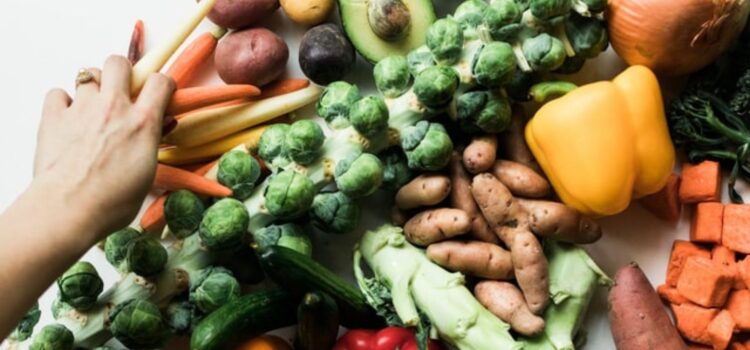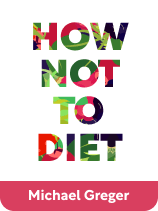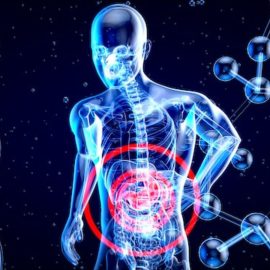

This article is an excerpt from the Shortform book guide to "How Not to Diet" by Michael Greger. Shortform has the world's best summaries and analyses of books you should be reading.
Like this article? Sign up for a free trial here.
Do you want to lose weight? Do you know how to lose weight on a plant-based diet?
In How Not to Diet, Michael Greger explains why eating plant-based foods helps to accelerate weight loss. He suggests four dietary changes to achieve this that you can implement into your daily eating habits.
Let’s look at how to lose weight on a plant-based diet with Greger’s suggestions.
Dietary Change #1: Consume Most of Your Calories Early in the Day
The first thing you need to do if you want to learn how to lose weight on a plant-based diet is to aim to eat your largest meal in the morning, and your smallest meal in the evening. Greger explains that the amount of time and effort your body spends digesting food decreases during the day. This means that you burn more calories digesting food in the morning than you do in the evening. Therefore, eating more food earlier in the day reduces the overall number of calories your body stores as fat throughout the day.
Example: Consuming Food Early Decreases the Number of Calories Your Body Stores
Since metabolic rates hinge on multiple factors, Greger doesn’t define exactly how many more calories you burn in the morning. However, we’ll provide a hypothetical example to illustrate how this principle works.
Let’s say that, during digestion, you burn half the calories of the food you eat in the morning compared to a quarter of the calories of the food you eat in the evening. If you consume 1,000 calories during the day, the number of calories you burn or store as fat would differ depending on when you ate your largest meal.
If you consumed 750 calories in the morning and 250 calories in the evening, you would burn 437.5 calories and store 562.5 as fat: (750 ÷ 2) + (250 ÷ 4) = 437.5 calories burned. 1,000 – 437.5 = 562.5 calories stored.
However, if you consumed 250 calories in the morning and 750 calories in the evening, you would burn 312.5 calories and store 687.5 as fat: (250 ÷ 2) + (750 ÷ 4) = 312.5 calories burned. 1,000 – 312.5 = 687.5 calories stored.
(Shortform note: While research backs up the claim that early meals contribute to weight loss, it offers a different theory to explain it. Studies reveal that people who eat most of their daily calories in the morning don’t burn more calories than those who eat more in the evening. However, people who eat a large breakfast do report feeling less hungry during the day and don’t feel the urge to snack between meals. Therefore, because consuming a large breakfast helps keep calorie intake in check, it can contribute to weight loss.)
Dietary Change #2: Eat 30 Grams of Fiber Each Day
As we’ve previously discussed, fiber reduces both your appetite and the number of calories your body digests. However, Greger argues, 97% of Americans fall far short of the recommended minimum daily amount. (Shortform note: Recall that the recommended daily intake for people under the age of 50 is 25 grams for women and 38 grams for men.) He suggests that you can easily up your fiber intake by replacing white foods with whole grain equivalents (for example, replacing processed white pasta with whole wheat pasta) and adding root vegetables and legumes such as chickpeas, lentils, and black beans to your diet.
(Shortform note: Research validates Greger’s claim that most Americans fall short of the recommended minimum daily amount of fiber. However, while there’s no disputing that consuming more fiber helps you lose or maintain weight, proceed with caution: Gradually introduce fibrous foods into your diet. Research reveals that dramatically increasing your daily intake can cause adverse side effects. These effects include bloating, abdominal pain, flatulence, diarrhea, constipation, and temporary weight gain. It can also create complications for people with Crohn’s disease or diabetes.)
Dietary Change #3: Start Every Meal With Water or Foods With High Water Content
Greger suggests that, in addition to staying hydrated throughout the day, you should drink water before each meal. This is because any water you drink sits in your stomach for a short while, during which time it makes you feel full. Additionally, eat water-rich foods such as fruits, vegetables, soups, or salads as a starter. The water you drink or consume will satiate you and reduce your appetite for the main meal. As a result, you’ll consume fewer calories overall.
Dietary Change #4: Add Anti-Inflammatory Ingredients to Your Food
Gregers suggests that you drink three cups of green tea each day, and add the following ingredients to your food: turmeric, ginger, garlic, nutritional yeast, vinegar, black cumin, and cayenne pepper. These ingredients are high in anti-inflammatory properties (Inflammation creates hormone imbalances that increase blood sugar levels and appetite.). This means that consuming anti-inflammatory ingredients prevents blood sugar spikes, regulates appetite, and boosts metabolism.

———End of Preview———
Like what you just read? Read the rest of the world's best book summary and analysis of Michael Greger's "How Not to Diet" at Shortform.
Here's what you'll find in our full How Not to Diet summary:
- How eating processed foods and animal products leads to weight gain
- Why eating plant-based foods reduces the calories your body stores as fat
- What dietary changes will help you shed excess pounds and keep them off






